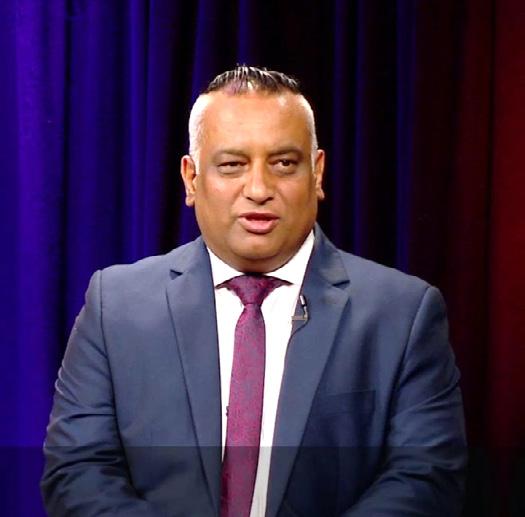
3 minute read
PRACTISING COMPASSION
from 2019-02 Melbourne
by Indian Link
"Iwas ecstatic,” Dr. Sundar tells Indian Link, about being informed that he was to be honoured with OAM this year. “I came here as a young practitioner in 1974 - that’s 40 years ago - and worked hard to be where I am today. So it feels absolutely fantastic to receive this recognition.”
Dr. Sundar, 75, was born and raised in Ooty (India), and completed his education in Pondicherry and Delhi. “I was working in Delhi University, researching on cirrhosis of the liver in children. At the time, an Australian professor, Prof McDonald saw my work and invited me to be a resident in Perth’s Princess Margaret Hospital and learn more about the disease in Australia’s Aboriginal as well as other communities.”
Two years later, he moved to Newcastle Hospital and worked as a registrar in paediatrics. Over the years, after having worked across the country - Campbelltown, Liverpool, Kiama and more - Dr. Sundar now practices at Toongabbie at Dr Sundar Family Medical Practice. But how did the change from paediatrics to general practitioner happen? “I wanted to expand my repertoire and I thought I’d get to work with people of all ages, right from birth to old age.” of his ability has been the key dictum of his professional journey. “It is doubly important that we contribute to the betterment of our country so our grandchildren are the beneficiaries of our efforts,” he concluded.
Dr. Sundar, now a GP for 40 years, also talks about treating diabetes, the most highlyprevalent disease among Indians in Australia.
Dr Purkayastha retired from full time
During his time with Australian Indian Medical Graduate Association (AIMGA), Sundaram worked relentlessly every year to treat members of the Indian community. “I noticed that Indians had high levels of blood sugar, obesity and hypertension. In one case that’s particularly astounding, I found a 9-yearold boy with Type-1 diabetes. That spurred me on to conduct check-ups in different communities every year. I began working with Indians, and then Filipinos.”
He would even sit at the local shopping centre now and then for an hour and offer to do medical check-ups free of cost. “Of course, I didn’t know then that I would receive an award for it,” he laughs. “At the time, I just wanted to do something for the community.”
Dr. Sundar has been part of numerous associations through which he has actively contributed to the society, such as Australia India Medical Graduate Association, the AASHA Foundation, Blacktown Medical Practitioners Association, NSW Indian Welfare Association, United Indian Association and Tamil Manram.
Of these, the UIA and Tamil Manram are especially close to his heart. “As part of Tamil Manram, my wife (Rani) and I started sponsoring the Tamil school. That was 27 years ago and it had only one student. Today we’ve got 300 students. I’m so proud that we were able to sponsor them back then.” work in 2017 to enjoy the company of his granddaughter Shanaya. He is therefore particularly delighted to share this happiness with her in the years to come.
Usha Ramanujam Arvind
He says about UIA, “It houses so many multicultural groups where people can get together, celebrate festivals together. Our children grow up together, those things are so important.”
So what does the future hold for Dr. Sundar?
“I want to continue my work in diabetes for Indians here. I’d also like to get more involved in counselling for elderly parents who are victims of domestic violence. Another cause that I feel very strongly about is children being exposed to violence through films. It’s very disconcerting to me when I see parents bringing toddlers and young kids to violent movies. I’d like to do something about it.”
Dr. Sundar adds with a smile, “I won’t be retiring. Not any time soon.”
Neha Malude
Creating a cultural mosaic to champion an ideal of multiculturalism, Melbourne artist Nawal Kishore Moudgil has much to celebrate this year.
His School of Indian Music and Dance Australia (SIMDA) will mark its 25th year in 2019 and continue to add flavour to the vibrant city of Melbourne.
As one of the first few institutions to offer music, tabla, harmonium and voice training tuitions in this city, SIMDA has changed over the years but is still going strong, according to its founder NawalMoudgil.
“We started in 1994 when learning to play Indian musical instruments like tabla, harmonium etc. was in demand,” Moudgil explained. “With the advent of new technology like MP3 the musical scene has changed and we have adapted accordingly. I now also impart online training and our learning session demand averages at 10 weeks.”
He continued, “Whether it’s work or volunteering, teaching Indian music in Australia has been an incredibly rewarding experience of cultural exchange that has inspired me to continue. Music is a universal language with the power to cross nationalities, languages, and age.” Knowing and preserving the various cultural values that exist, he observed, serves to bring about an understanding and tolerance between people and countries.
Much awarded for his work in creative and performing arts industry, Moudgil received the Sir John Monash Volunteer of the Year award last year.
He has also been awarded the Victorian Multicultural Excellence Award in 2017 and 2016, Sir John Monash Community Award in 2016 and Serendib SriLankan Spirit Award in 2016.

Moudgil recently finished directing a full day Sawan Multicultural Spring Festival






